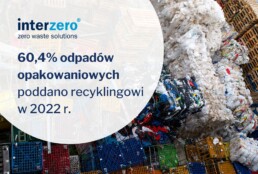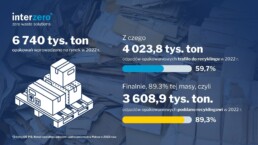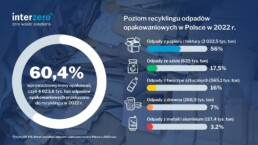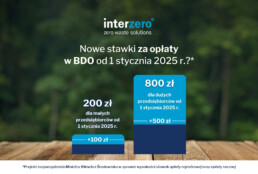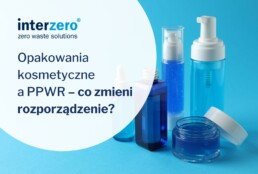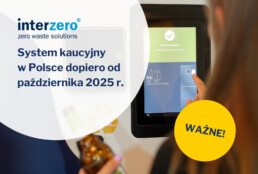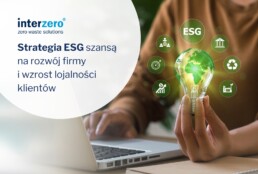Stand-alone introducers did not meet annual recycling targets for packaging waste in 2022.
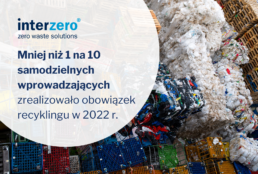
Stand-alone introducers did not meet annual recycling targets for packaging waste in 2022.
Only 8% stand-alone introducers achieved the minimum statutory recycling levels in 2022. - according to the IOŚ-PIB report Packaging and packaging waste management in Poland in 2022. During the same period, recovery organisations met or even exceeded annual recycling targets for all types of packaging waste.
Only 8% stand-alone introducers met the recycling obligation
Of the introducers who chose to ensure recycling of their generated packaging waste themselves, as many as 11 234 entities were obliged to achieve the required recycling rates, which in 2022 were:
- 30% for plastic waste,
- 51% for aluminium waste,
- 55% for ferrous metal waste,
- 66% for paper and cardboard waste,
- 62% for glass waste,
- 19% for waste wood,
- 59% for all the above types of packaging waste combined.
On the basis of data from the BDO register, EIA-PIB experts calculated that only 8% stand-alone introducers achieved these minimum levels of. The percentage of independent introducers who managed to meet the statutory minimum is shown in the chart below:
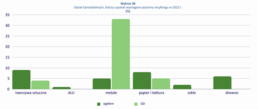
Source: Report Economy of packaging and packaging waste in Poland in 2022.
At the opposite end of the spectrum are recovery organisations that in 2022 met the statutory recycling targets for metal, glass, paper and cardboard packaging waste and exceeded the required recovery rate for plastic packaging waste[i].
Cooperation with a recovery organisation as an opportunity to fulfil your obligation and avoid a product fee
Failure by an entrepreneur to achieve the statutory recycling levels for packaging waste results in the need to charge and pay a product fee, which is a kind of environmental tax. To avoid the obligation to pay the fee, the entrepreneur may transfer his recycling obligation to a recovery organisation packaging waste generated from the packaging and packaged products it introduces. This will ensure that the introducer pays only a fixed, low amount for the contract with the recovery organisation and does not have to worry about ensuring waste recycling.
Hand over your recycling obligation to Interzero Recovery Organisation
Interzero takes over the recycling obligations of businesses in terms of:
- packaging waste,
- batteries and accumulators,
- post-consumer products: tyres, oils and greases,
- electrical and electronic equipment.
As a result, each the entrepreneur can comprehensively delegate all his/her responsibilities to us resulting from the marketing of packaging and products. Find out what obligations your company is subject to!
By signing a single contract, you will be sure to meet your company's obligations to ensure statutory levels of recovery, recycling and preparation for re-use.
[1]Packaging and packaging waste management in Poland in 2022, https://ios.edu.pl/wp-content/uploads/2024/09/gospodarka-opakowaniami-i-odpadami-opakowaniowymi-w-polsce-w-2022-r-2.pdf
Where to donate food after Christmas? Christmas zero waste solutions
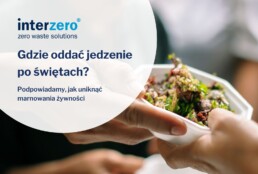
Where to donate food after Christmas? Christmas zero waste solutions
Christmas, holidays and post-Christmas, and the fridge still full? Excess food: bought, prepared and then thrown away is almost a regular feature of every celebration and family gathering. Where should we put the food after Christmas so that its waste does not become a new, not very ecological tradition?
How not to waste food? Learn about foodsharing
Approximately 4.5 million tonnes of food are wasted in Poland each year, and as much as 60% of this is wasted in households. Why? The most common reasons declared by respondents for throwing food away are:
- expiry date - 60%,
- shopping too much - 26%,
- improper storage - 26%,
- purchase of unpalatable products - 25%,
- purchase of poor quality products - 17%,
- excessive meal portions - 18%,
- no idea how to use the products - 10%[i].
The amount of food thrown away increases dramatically over the Christmas and New Year period. It is estimated that as many as 83% people throw away food during this time. The 24th of December has even been unofficially dubbed Christmas Food Waste Day - in Poland alone, as much as 9,200 tonnes of food ends up in bins on that day[ii].! Can this be remedied?
For environmental reasons, we encourage, above all, moderation, which is one of the most important components of the our recipe for Christmas peace. We assume, however, that since you have arrived here, you have just you are struggling to manage your food after Christmas and you are looking for the best solution for you and nature.
The remedy for most of these problems is foodsharing. The movement encourages donating surplus food to people who are happy to accept it and literally save it from going to waste. There is only one condition - the food must still be fit for consumption.
Where to donate food after Christmas? Map of food pantries in Warsaw and all over Poland
One way to do festive foodsharing is to use food pantries, also known as community fridges. Dining halls are communal fridges, cupboards and sometimes small rooms that allow food to be exchanged. Not only can you leave fresh produce or dishes in them, but you can also take what others have left on the shelves.
What to donate to the eatery? Only food that we would eat ourselves. Importantly, it may be past its best-before date - dry and loose products, tinned foods, condiments and sometimes even properly stored dairy products are often fit for consumption after the date indicated on the packaging. Donating food to an eatery However, it is worth following a few rules:
- products should be placed in clean packaging and sealed tightly,
- a note should be placed on the home-cooked dishes with their composition and date of preparation,
- products can be left previously opened, but the date of opening should be indicated (mainly for food that spoils quickly),
- if a dish needs to be stored at a low temperature, it absolutely must be placed in the fridge!
Against the odds, Eateries are not the domain of large cities - you'll find them in small towns too!
See the nationwide map of eateries
Go to the map of eateries in Warsaw
Don't see your location here? Try searching for it on an online search engine, for example - the network of eateries is constantly expanding, so there may be outlets in your area that are not yet marked on the map.
List of places where you can donate food after holidays, events and every day
Eateries aren't the only places you can donate food to after Christmas (and not just after Christmas). See where else you can share your food!
- Food Banks
These are charitable institutions that accept any type of food and then distribute it to those in need. All food products (including non-perishable products, e.g. bread, dairy products, meat, fruit and vegetables) can be donated to such a bank at least 2 days before the expiry date. There are 31 such banks in Poland. View map of Food Banks.
- Facebook groups and local forums
Food sharing is also enabled by social media and local groups, which you will find under names such as:
- Online dining, foodsharing, freeganism,
- I will donate, attention, the rubbish truck is coming (or simply: rubbish truck),
- we do not waste food.
- Branches of Caritas Polska
Caritas has long been active in helping those in need while at the same time tackling food waste. Local Caritas branches often accept unwanted food that is left over in the fridge after Christmas or an event, for example. It is worth contacting your nearest Caritas branch and donating the food to them, which will then be distributed to those in need.
- Facilities for people in crisis of homelessness
Surplus food from the holidays is also readily accepted by night shelters and shelters for people in crisis of homelessness. You can find a list of all such establishments by voivodeship on the website of the Ministry of Family Affairs, Labour and Social Policy.
And when you do have to throw away... How do you avoid wasting food that ends up in the bin?
Sometimes food has to be thrown away - it's spoiled, over-salted, burnt, there can be many reasons. However, it is worth doing this with your head. Properly sorted waste from the table, fridge or kitchen cupboard can still be recycled organically, i.e. composted or fermentation.
Where to throw food away? Most food is disposed of in the brown bin for bio-waste. This is where unwanted, spoiled or out-of-date food should go, but with some exceptions. Leftover meat, sausages and bones are mixed wasteas are eggs, cheese and other animal products. Mixed meals containing animal products, e.g. salads or sauces, are also not bio-waste. Check what we throw away and what we don't throw away in bio-waste.
An alternative to the bio-waste bag is the composter: domestic, kitchen or electric. It allows you to turn bio-waste into natural and completely free plant fertiliser, which can be produced in as little as 24 hours! Such opportunities include Oklin composter from the Smart range.
[i] Zero recycling point in Poland, https://portalkomunalny.pl/wp-content/uploads/2024/12/raport-punkt-zero-recyklingu-w-polsce.pdf
[ii]. Christmas, festivities and... into the bin. We throw away 1.6 kg of Christmas food per person, https://www.rp.pl/przemysl-spozywczy/art41538111-swieta-swieta-i-do-kosza-wyrzucamy-1-6-kg-swiatecznego-jedzenia-na-osobe
Segregation of construction waste - changes from January 2025.

From January, changes in the way construction and demolition waste is separated
From 2025 onwards, segregation of construction and demolition waste at source will not be mandatory. The abolition of the obligation to segregate at source (which has not even taken effect yet) is provided for in the draft amendment to the Waste Act, which the Council of Ministers adopted during its meeting of 29 October 2024.
Abandonment of the obligation to separate construction and demolition waste at source
The most important provisions of the amendment are abolition of the obligation to segregate, i.e. separate collection of construction and demolition waste on site and defining responsibility for sorting out the waste fractions.
Each contractor generating construction and demolition waste will be required to segregate at least 6 fractions at the point of generation:
- wood waste,
- metal waste,
- glass waste,
- plastic waste,
- gypsum waste,
- mineral wastes, including concrete, bricks, tiles and ceramic materials and stones.
The draft amendment to the Waste Act was created in response to interpretative doubts and potential problems with the organisation and cost of selective reported by representatives of the construction industry. The previous version of the legislation, which was due to come into force on 1 January 2025, lacked a clear statement on whom the obligation to selectively collect and collect construction and demolition waste falls. The need to sort them for 6 fractions on site would also result in a sharp increase in the cost of exporting such waste, which in turn could contribute to its illegal dumping and dumping directly into the environment.
The waste generator will be able to have the waste segregated
According to the provisions of the Act amending the Waste Act, an entrepreneur generating construction and demolition waste will be able to hand them over to another authorised operator who will take over the obligation to separate them into a minimum of 6 fractions off-site generation. Importantly, the transfer of waste to another entity does not completely relieve the generator of construction and demolition waste of its responsibility to fulfil the segregation obligation. If this obligation is not fulfilled through the fault of the entity that has taken over the waste, both entities (generator and transferee) will be jointly and severally liable.
The new rules are due to come into force from 1 January 2025.
Handling of construction and demolition waste according to the hierarchy
In the explanatory memorandum of the bill, its authors emphasised the need for entrepreneurs to adhere to the so-called waste hierarchy:
providers of construction, demolition, renovation services (building contractors) are obliged to prevent waste.[i]
As a first step, therefore, measures should be taken to prevent construction and demolition waste. Selective waste collection should only take place when the materials in question are no longer reusable. The sorting itself, on the other hand, is intended to ensure suitability for preparation for reuse, recycling and other recovery. Regardless of where they are sorted (on-site or off-site), the individual fractions of construction and demolition waste should then be handed over to specialised entities for further management. For this purpose, it is often necessary to commission a professional collection of construction and demolition waste from a designated address offered by, among others, the waste collection company Interzero.
[i] https://orka.sejm.gov.pl/Druki10ka.nsf/0/A065E318FFC3BE21C1258BC70041F23F/%24File/766-uzasadnienie.docx
Resolution of ESG reporting - see details
The Sejm on 21 November adopted an amendment to the law on sustainability reporting obligations. The obligation to file an ESG report for 2024 will cover more than 3,000 companies in Poland. As early as 2026, regulation will cover small and medium-sized companies listed on regulated markets. Is Polish business ready for this?
What do the new regulations mean for Polish companies?
The introduction of mandatory ESG reporting in Poland will have a significant impact on companies that meet the criteria set out in the EU CSRD. As in other EU countries, these companies will be obliged to prepare annual sustainability reports. These reports will have to comply with the legal requirements and standards set out in the EU regulation. ESG documentation will be placed on a par in terms of form with financial reports and its content will have to be approved by independent auditors. Failure to comply with the obligation to produce a report may lead to serious consequences, including criminal liability.
What about companies that will not be required to report?
Companies on which ESG reporting will not be directly imposed will also be affected by the enactment of the Union Regulation. Why? We suspect that many of them will need to collect and analyse environmental impact data anyway. Arguably, these will be essential documents for contractors or companies within the same group of companies that will be subject to the reporting requirement. It is possible that support will be required from partners to provide relevant data. This is why we already encourage representatives of small and medium-sized companies to take an interest in the ESG topic. Without implementing a proper operational strategy - the business could be seriously affected in a few years' time. Customers are also more likely to turn to products and services from transparent providers.
A practical guide to ESG for every company
The Interzero team, knowing that both small and larger companies will need expert help to put ESG into practice, has prepared an e-book for you. It is a document that contains all the necessary information. It is written in simple, accessible language. In it, we explain what the CSRD is, introduce the reporting timeline, show you how to communicate on the topic of sustainability, and outline the operational steps you need to take to prepare your business for ESG. Fill in the form on our websiteand you will get access to it completely free of charge. Your education is one of the most important factors for the development of your business.
Summary and timetable
News about the enactment of reporting is just the tip of the iceberg. We know how much the Polish business model will now change and we want our clients to be prepared for this. As a company, we believe in technology and innovation. That is why we want to guide all those interested in the topic of ESG smoothly and calmly. We would like to remind you that reporting will be mandatory:
- from 2025 - for large companies (more than 250 employees and/or EUR 50 million turnover and/or EUR 25 million total assets),
- from 2026 - for listed SMEs.
Environmental Sustainability Dashboard - ESG non-financial reporting tool - our proprietary consulting solution. The tool will streamline your data collection and monitoring processes - so you can accurately track ESG indicators. It is a solution for companies that want to be ready for mandatory reporting. Clients get access to an online platform and full environmental impact assessment advice.
The recycling rate for packaging waste in 2022 was 60.4%
According to a report published by the Institute of Environmental Protection - National Research Institute, the recycling rate of packaging waste in 2022 was 60.4%. More than half of the recycled packaging waste (56%) was paper and cardboard waste. The highest recycling levels of either 89.1% or 83.9%, depending on the methodology used, were also recorded for this fraction.
Only and as much as 60.4% recycling of packaging waste
According to calculations by IOŚ-PIB experts, products packed in 6,740 thousand tonnes of packaging were put on the market in 2022. Data from 532 installations were taken into account, with a total of 4 023.8 thousand tonnes of waste entering the market in 2022. More than 10% of this mass consisted of so-called non-target materials (materials that are not recycled in a given recycling process into products, materials or substances that are not waste). After adjustment, the total the weight of recycled packaging waste was 3 608.9 thousand tonnes, including:
- 2,022.5 thousand tonnes of paper and cardboard packaging waste.
- 565.1 thousand tonnes of plastic packaging waste,
- 635,000 tonnes of glass packaging waste,
- 268,900 tonnes of wood packaging waste,
- 117,400 tonnes of metal packaging waste.
According to the methodology adopted by the authors of the report, The recycling rate for total packaging waste was 60.4%, an increase of 1.4 more than the minimum provided for in the Decree of the Minister of Climate and the Environment of 19 December 2021 on the annual recycling levels of packaging waste by year until 2030.
Recycling levels: achieved according to introducers, not achieved according to EIA-PIB
Recycling rates for total packaging waste were calculated in 2 options. The first one was based on data from introducers (entities that have entrusted statutory obligations to organisations) and stand-alone (entities responsible on their own). From this data, the recycling levels of individual packaging waste for 2022 were as follows:
- metals - 93.9%,
- wood - 20.9%,
- plastics - 40.7%,
- glass - 65.3 %,
- paper and cardboard - 89.1%.
According to this option, minimum annual recycling targets for packaging waste have been achieved for all types of packagingfrom which the waste originated.
The second variant calculation presented in the report was based on the methodology of IOŚ-PIB. The recycling levels calculated in this way for almost all packaging waste (except plastics) are at a lower level:
- metals - 36.6%,
- wood - 16.7%,
- plastics - 45.8%,
- glass - 45 %,
- paper and cardboard - 83.9%.
According to calculations based on the methodology of the EIA-PIB, in 2022, the introducers did not meet the minimum recycling levels for ferrous metal and aluminium packaging waste (amounting to 55% and 51% respectively) and wood (amounting to %).
Regardless of the option, the lowest recycling rate was recorded for wood waste.
BDO register as a source of data for the EIA-PIB report
The source of the data presented in the report is the BDO register. Gap takers, i.e. producers or distributors who place plastic packaging or packaged products on the market and do not report them to a producer responsibility organisation or public authority or otherwise take financial or financial and organisational responsibility for the management of plastic packaging waste or report smaller quantities than they actually place on the market, are not included in the calculations.
The analysis prepared by the EIA-PIB takes into account waste with codes:
- 15 01 01 - paper and cardboard packaging,
- 15 01 02 - plastic packaging,
- 15 01 03 - wood packaging,
- 15 01 04 - metal packaging,
- 15 01 05 - multi-material packaging,
- 15 01 06 - mixed packaging waste,
- 15 01 07 - glass packaging.
The actual amount of packaging waste generated in Poland and recycled was calculated as follows - adding up the weights of waste recycled in Poland and recycled abroad, reducing the result by the weight of waste imported to Poland for recycling.
Source: [1]
BDO fees will increase from 2025. How much will the annual fee and the registration fee be?
BDO fees will increase from 2025. How much will the annual fee and the registration fee be?
The draft regulation of the Minister of Climate and Environment shows that there will be a significant increase in the BDO annual and registration fee as early as 2025. For micro-entrepreneurs, this will increase from PLN 100 to PLN 200, and for other entities, from PLN 300 to as much as PLN 800.
Increase in BDO registration fee and annual fee
On 24 October 2024, a draft decree of the Ministry of Climate Change was published on the website of the Government Legislation Centre, which provides for an increase in the rates of the registration fee and the annual fee applicable from 2018.
From 2025 these will amount to:
- PLN 200 for micro-entrepreneurs,
- PLN 800 for other entrepreneurs.
This represents an increase of 100% and 166% respectively. The increase will cover all entitieswhich have a statutory obligation to register with BDO.
Check whether your company is required to register with BDO!
In accordance with the provisions of the Waste Act, BDO fee rates have been set in the range of PLN 50 to PLN 2,000. Their amount should not constitute an obstacle to registration or the exercise of economic activityespecially for micro, small and medium-sized entrepreneurs.
Prepared by the Ministry of Climate and Environment The draft was then submitted for opinion among others by employers' organisations and by the Joint Committee of Government and Local Self-Government. Due to the need to ensure the entry into force of the proposed regulations from 1 January 2025, the deadline for giving an opinion on the draft regulation was only five days.
In 10 years, medium and large enterprises will pay a subsidy of PLN 194.6 million, micro and small enterprises 70.9 million
According to the climate ministry's calculations, thanks to the BDO fee increase The total revenue from the registration fee and annual fee for the period 2025-2034 will be:
- for the state budget PLN 243.5 million,
- for the provincial budget (provincial marshals) PLN 134.8 million.
Over the projected 10-year period, medium and large enterprises will have to bear a total of PLN 194.662 million in additional costs, and micro and small enterprises PLN 70.942 million.
Why will BDO fees increase?
The reasons for the increase in the BDO registration fee and annual fee are explained in the explanatory memorandum to the draft regulation. As the climate department points out, fee rates have not been updated for more than 6 years. During this period cumulative inflation was 43.9%, which has meant that the real income from the registration fee and the annual fee has actually decreased. Furthermore, as of 2018. there has been a significant increase in costs associated with maintaining, running and developing the BDO, which has contributed to a reduction in the resources that can be allocated to the proper functioning of the Products and Packaging and Waste Management Database.
The registration fee and BDO annual fee rates proposed in the draft regulation take into account the aforementioned increase in costs both on the part of the voivodship marshals and on the part of the state budget. Let us recall that the fees payable by entrepreneurs for entry and maintenance of the register shall be collected by the Marshall of the Voivodship. They represent in 35.65 % the income of the provincial budget (the provincial marshal), who is responsible for maintaining the register, and in 64.35 % the income of the state budget and the Ministry of Climate and Environment, who are the BDO Administrator.
The course of the legislative process can be followed on the website of the Government Legislation Centre.
Who is required to pay BDO fees?
The catalogue of entities obliged to register with the BDO, and thus also to pay the annual and registration fees, is enumeratively defined in the Waste Act.
The following are obliged to pay the registration fee and the annual fee:
- equipment introducers and authorised representatives,
- the introducer of batteries or accumulators,
- vehicle introducer,
- producers, importers and intra-Community purchasers of packaging,
- introducing packaged products on the national territory,
- the importer of tyres on the national territory,
- introducing lubricating oils on the national territory.
Increased rates are not the only news at BDO
For some businesses, increased BDO rates are not the only concern. From 2025, an obligation to keep records of hazardous waste has been introduced and, at the same time, the existing exemption enjoyed by small waste generators has been abolished. These changes will primarily affect the beauty industry, including hairdressers, barbers, make-up artists, make-up artists, nail, eyelash or eyebrow stylists. For more information follow the link.
From 2025, an obligation to segregate construction and demolition waste into 6 fractions has also been introduced. The most important change is the abandonment of the obligation to segregate R & D waste at the place where it is generated - the entrepreneur can outsource this to another authorised entity with permits and an entry in the BDO, provided that an appropriate agreement is concluded. For more information, see the entry at the link.
Cosmetics industry facing PPWR - mandatory eco-design of cosmetics packaging
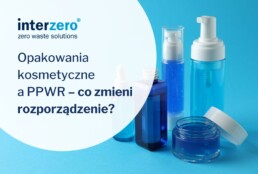
Cosmetics industry facing PPWR - mandatory eco-design of cosmetics packaging
The PPWR Packaging and Packaging Waste Regulation provides for a number of new obligations for cosmetics manufacturers, importers and distributors. They aim to reduce the amount of packaging waste generated and increase the use of recycled materials.
Requirements of the PPWR for cosmetic packaging
Contained in the draft PPWR regulations will affect all businesses introducing packaged products. Cosmetics manufacturers are also included in this group. Let us recall that the current Packaging and Packaging Waste Directive does not introduce any specific requirements for the entire life cycle of cosmetic packaging. However, we are about to experience a real packaging revolution in the cosmetics industry.
With the entry into force of the provisions of the PPWR, the following requirements will apply to the cosmetics industry:
- minimising packaging,
- suitability of packaging for recycling,
- mandatory use of recyclates,
- the need to restrict certain packaging formats (e.g. mini hotel products),
- mandatory labelling of packaging as to sorting and reusability,
- reuse of transport and collection packaging,
- an obligation to reduce the use of biodegradable and compostable packaging.
Minimisation of cosmetic packaging in the spirit of the PPWR regulation
The draft packaging regulation adopted by the EP obliges manufacturers of cosmetic packaging to reduce its weight and volume as much as possible. However, this must be done without compromising the safety of the products packaged in them or the functionality of the packaging itself. This functionality is understood through the following criteria:
- Product protection,
- production and filling processes,
- logistics,
- information requirements,
- hygiene and safety,
- legal requirements,
- recycled content, recyclability and reusability.
From the market multi-layered, double-walled, false bottom packaging will therefore disappear and other elements whose sole purpose is to increase the volume visually.
Minimisation of volume will also have an impact on transport and bulk packaging, in which the the void ratio will be up to 40%.
Suitability of cosmetic packaging for recycling in light of the PPWR regulation
The recyclability of cosmetics packaging will be assessed according to criteria to be implemented in two stages. In phase I, presumably from 1 January 2030, each packaging will have to meet EU design criteria for recycling (Design for Recycling), which take into account the state of the art, collection and sorting. In phase II, implemented from 1 January 2035, packaging will have to meet DfR criteria and an additional criterion demonstrating their 'large-scale' recyclability.
The PPWR regulation will therefore make it necessary to eco-design of all packaging, i.e. designing it for later recycling.
Cosmetics packaging will be categorised into different recyclability classes, the highest of which will be class A, indicating a recyclability of 95% or more by weight of packaging. Packaging whose recyclability will be less than 70% by weight (Class E or below), will not be able to be placed on the market in the EU. The amount of the product fee (eco-modification) will also be linked to the recyclability class.
Recycled cosmetic packaging as a new reality after PPWR
The draft PPWR regulation also provides for Mandatory use of plastics recovered from post-consumer waste (recyclates) for cosmetic packaging. The way in which it will be determined (per unit of packaging, per manufacturer's product portfolio or per other unit) has not yet been definitively confirmed, nor have the levels of use of recyclate proposed to the cosmetics industry. Initially, these were to be 10% of recyclate by 2030 and 55% by 2040. Whether these proposals will be maintained or increased is likely to be known by the end of this year.
In order to meet the projected regulations, leading players in the cosmetics industry are constantly expanding their range of products in recycled or recycled-infused packaging. Such ecological cosmetic packaging They are also often minimised.
Mini-hotel cosmetics under censorship
Not all types of packaging will see a major overhaul - some of them will be completely banned. We are talking about miniature hotel cosmetics. This packaging format has been assessed by the European Commission as excessive or unnecessary.
Once the PPWR comes into force, however, travel mini cosmetics up to 100 ml will remain on drugstore shelves - only hotel products will be banned. However, it is well known that the EC may expand the catalogue of banned packaging in the future.
PPWR-compliant labelling of cosmetic packaging
The PPWR regulation also aims to harmonisation of the labelling on packaging. They will have to clearly indicate the material composition packaging to make it easier for consumers to sort their packaging waste. Reusable packaging, meanwhile, will feature a QR code or other information to facilitate reuse.
With the introduction of the new labelling, information that could confuse or mislead consumers will be prohibited on the labels and throughout the packaging.
PPWR regulation as a stop on the road to sustainable cosmetic packaging
All requirements under the draft PPWR are designed to reduce the consumption of primary raw materials, slow down the rate of growth of packaging production and increase the proportion of recycled materials in almost all packaging, not only cosmetic packaging. The effect of their implementation is to bring the whole EU closer to the goal of a low-carbon, closed-loop economy.
PPWR regulations cover the entire life cycle of packaging, placing particular emphasis on designing for later recycling and closing the raw material cycle. This is due, among other things, to the fact that plastic packaging is highly carbon intensive, and in terms of fossil fuel consumption recycling of the resulting waste is five times more beneficial than incineration with energy recovery[i].
The final text of the PPWR was adopted by the European Parliament on 24 April 2024. As expected, the Council will confirm the adoption of the regulation by the end of this year at the latest, and the new rules will take effect from 2026.
[i] https://data.consilium.europa.eu/doc/document/ST-16946-2023-INIT/pl/pdf
What are Olympic medals cast from? Precious trophies from waste
Gold in name only - the most valuable Olympic medals are not made of gold!
Let's start at the beginning, which is what Olympic medals are cast from. Although this may seem shocking, gold medals are not made of gold at all! They are produced from top-grade silver (>995), which is then gold plated, this time with real gold at a symbolic 6g. Interestingly, gold medals have not been gold for over 100 years - the last time pure Olympic gold was awarded to athletes was at the 1912 Stockholm Games.
The situation is different for Olympic silver medals, which are silver not just in name. Like the most valuable pucks, they are also Olympic silver is produced from silver of a purity >995. Bronze medals, on the other hand, are cast from an alloy of copper, tin and zinc.
Medals from waste - the Olympic idea at the service of recycling
The medals presented at the modern Olympic Games were usually created from primary materials. The breakthrough came during the 2016 Rio Games, when the silver and bronze medals were made in 30% from recycled metals. These medals were hung on ribbons, which in turn were produced from recycled bottles.
A step further was taken by the organisers of the 2021 Tokyo Olympic Games. - They decided to make medals made from 100% recycled electro-waste material. The entire Japanese public was involved in the collection of this electro-waste, donating old phones, computers and small electronics for months. From the electro-waste collected 4.1 tonnes of silver, 2.7 tonnes of bronze and more than 30 kg of gold were recovered, from which around 5,000 medals could be cast.
Olympic medals are just one of the non-obvious uses of recycled materials. Check out what else is made from recycling!
Medals not only recycled, but also... refurbished
The idea of casting Olympic medals from recycled metals continued at the 2024 Olympic Games in Paris. In addition to recycled silver, gold, copper, tin and zinc, They also included ... iron fragments from the Eiffel Tower. They were obtained during the renovation and then sunk inside each of the medals. In this way, the top Olympians each received exactly 18 grams of iron from the most important symbol of Paris.
9 month delay in bail system. What does this mean for the packaging industry?
9 month delay in bail system. What does this mean for the packaging industry?
The government has decided that the deposit system will not start before 1 October 2025. The draft law adopted by the Council of Ministers amending the Packaging and Packaging Waste Management Act also clarifies the provisions on the settlement of deposits and introduces a number of other changes that have long been requested by entrepreneurs.
The bail system will start on 1 October 2025.
The most important change approved at the Council of Ministers meeting held on 29 October is postponement of the launch of bail schemes - from the originally planned 1 January 2025 to 1 October 2025.
The shortening of the reference period is intended to enable introducers and deposit system operators to better preparation for separate collection. This mainly concerns adjustment of the area of commercial units (installation Bottle machines, the organisation of a bag system), so that the deposit system will cover the whole country and all consumers concerned will have the opportunity to return their deposit. The changes are due to come into effect from 1 January 2025.
It will be recalled that the discussion about the possibility of postponing the start of the bail-in system began with statements by Climate and Environment Minister Paulina Hennig-Kloska, who said on 16 October that the bail system is not ready to enter into force. On 21 October, an auto-amendment to the Packaging Act, introduced by the Minister, appeared on the website of the Government Legislation Centre, which would have given the operators of the deposit system the opportunity to request a postponement of the start date from 1 January 2025 to 1 July 2025. In the end, it was decided at the cabinet meeting to postpone the start of the deposit system even further.
Postponement of the launch of the deposit system at the request of operators
The draft amendment adopted by the Council of Ministers provides for the possibility of amending existing licences for the bail system limited to a change of date the launch of the system on 1 October 2025. According to Article 7 of the amendment bill, this will take place upon application by operators who have already been authorised to operate a bail system before the amendment enters into force.
By 17 October 2024, the Minister of Climate and Environment had issued 4 final administrative decisions granting permits to operate the bail-in system, which indicated 1 January 2025 as the start date. - informed Paulina Hennig-Kloska.
The deadline for submitting an application is 7 days after the law comes into force. Operators' applications will be processed within the same timeframe. Importantly, the bill does not provide for the possibility of refusing to modify an issued authorisation to the extent that it is limited to a change in the start-up date of the system.
Change in the calculation of recycling rates
A consequence of the postponement of the start of the deposit system is a change in the way the levels of separate collection of packaging waste covered by the system are calculated. According to Article 9 of the draft law, these will be calculated on the basis of the weight of packaging placed on the market between 1 October and 31 December 2025.and not from 1 January to 31 December 2025, as originally envisaged.
Inspections by the WIOŚ before and after the launch of the bail system
The amendment to the Packaging and Packaging Waste Management Act obliges provincial environmental inspectorates to carry out inspections both before and after the launch of the deposit system. The tasks of the Voivodeship Inspectorates of Environmental Protection will include, among others, control of representing entities which is to contribute to ensuring that the systems have been set up correctly and are functioning as authorised.
Explore comprehensive Interzero services for all participants in the bail system.
What else will the amendment to the Packaging Act change?
In addition to the above amendments, the bill introduces a number of additional changes, largely advocated by businesses, including:
- exclusion of milk and milk-based drinks from the obligation to collect packaging and packaging waste,
- the introduction of a so-called closed bail system, i.e. the obligation to charge deposits at each stage of the sales chain,
- allowing retailers to use, for example, distribution centres to collect packaging waste collected from retail units without having to obtain a waste collection permit,
- Adding a requirement for each municipality to have at least one stationary collection point for packaging and packaging waste as part of a deposit system,
- making it compulsory for retailers with less than 200 m of floor space to accept reusable glass bottles2if the unit sells drinks in such bottles,
- introduction from 2026 changes in height product levy borne by introducers who have not joined any deposit scheme. The product charge will be calculated as three times the product charge rate specified for the type of beverage packaging.
Adopted by the Council of Ministers, the draft was submitted to the Sejm on 30 October 2024 and was referred to the first reading a day later. The course of the legislative process can be followed on the Sejm website.
68% micro and small companies already have an ESG strategy. Are you among this group?
68% micro and small companies already have an ESG strategy. Are you among this group?
Small business is getting more and more involved with ecology - almost 70% of the smallest Polish companies have no doubt that introducing activities beneficial for the Earth not only influences the state of the environment, but also profitability. The vast majority of initiatives undertaken by small entrepreneurs result from the expectations of other entities, including consumers.
ESG strategy as an opportunity for company growth and increased customer loyalty
From a report by EFL and Credit Agricole Bank Polska Diagnosis of the level of ESG knowledge and practices in micro and small companies it follows that already more than 2/3 of entrepreneurs have decided to develop an ESG strategy for their company. It is worth noting that usually these activities result from:
- growing customer expectations - 56%,
- requirements of financial institutions - 51%,
- conditions imposed by suppliers and contractors - 46%.
Even more, 81% micro and small entrepreneurs believe that sustainability measures are important for their businesses. Among representatives of such companies environmental and climate change issues are seen not as a burden and a cost, but as an investment in development enterprises.
Small entrepreneurs see numerous benefits from implementing ESG practices. In their view, such measures increase employee motivation and productivity, build customer trust and loyalty, and enhance brand value.
What sustainable practices does small business choose?
Interestingly, in the smallest companies on the market the ESG strategy is usually contained in another document. This is the practice chosen by as many as 33% respondents. Only 10% entrepreneurs prepare a separate document for this purpose, and as many as ¼ do not create one at all, but apply unwritten rules. This is a kind of contrast from the largest market players, who have already been required to report individual ESG indicators in writing this year.
Prepared by EFL and Credit Agricole Bank Polska, the report also indicates activities in ESG areas, which representatives of micro and small companies declare to undertake. Among them we find:
- recycling and waste management - 74%,
- Water consumption monitoring - 64%,
- Energy consumption monitoring - 68%,
- thermal modernisation of buildings - 52%,
- RES installation - 42%,
- low-emission vehicle fleet - 39%.
Definitely less frequent companies decide to measure their carbon footprint themselves and their suppliers. Such actions are declared by 22% and 18% respondents respectively. Perhaps this is due to the adoption of a strategy of small steps - micro and small enterprises need to measure themselves by their strengths and implement further green practices gradually.
Monitoring of carbon footprint and ESG indicators as a future trend
In the coming months and years, we can expect to see more activity in moving towards low- or zero-carbon and the implementation of tools for calculating and monitoring the carbon footprint companies. Such a tool is Enviromental Sustainability Dashboard, which combines the ability to calculate and control ESG indicators with a consultancy service to identify your company's key data and learn about ways to improve your environmental performance.
Findings from the analysis of data from the Enviromental Sustainability Dashboard tool are also the basis for any company's sustainability strategyThe Commission's aim is to help the Member States to make the best possible use of their resources, to set the course for environmental change and to monitor the effectiveness of the measures that have already been taken. Why is this so important? Take part in an online training course "Non-financial reporting and corporate sustainability".during which you will learn when and what to report and get a closer look at the ESD tool from Interzero.
Sources:
- Report: 68% micro and small companies have an ESG strategy report, https://media.efl.pl/informacje/raport-68-mikro-i-malych-firm-posiada-strategie-esg
